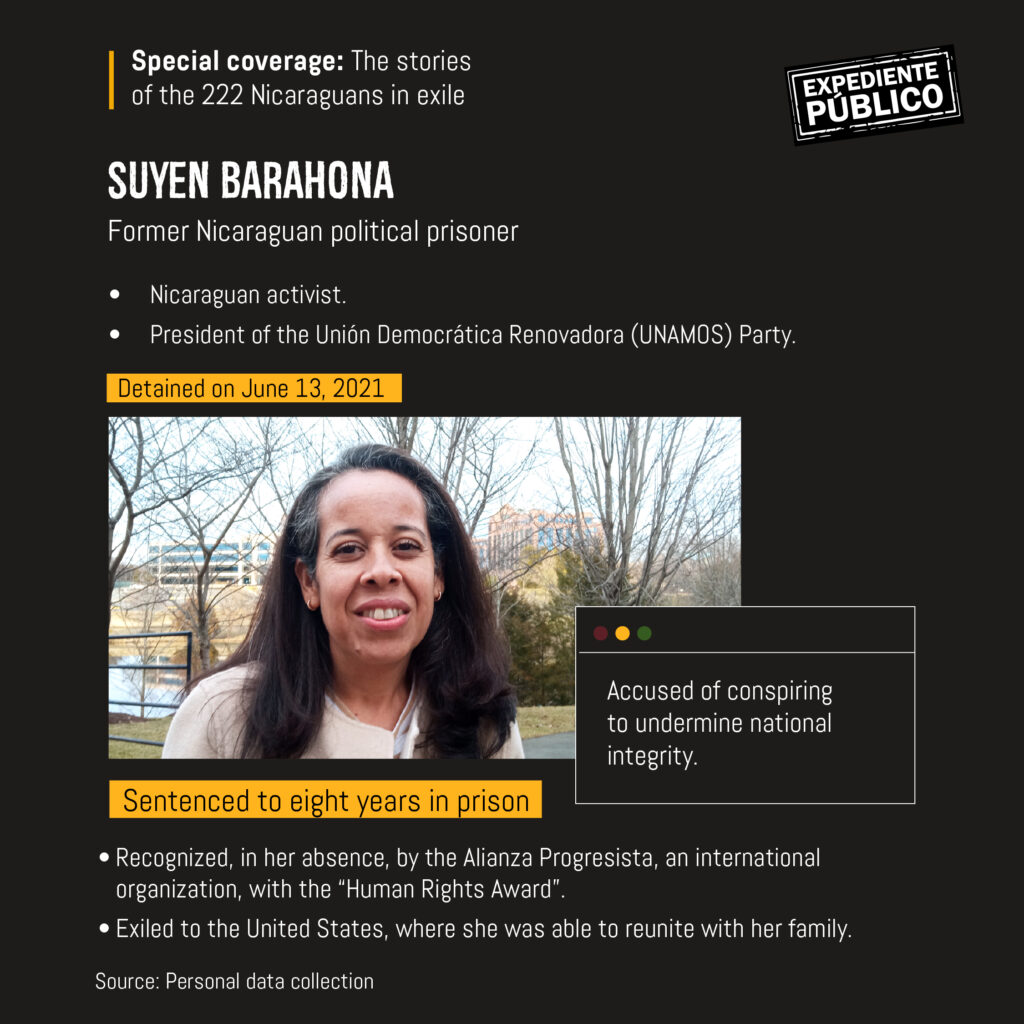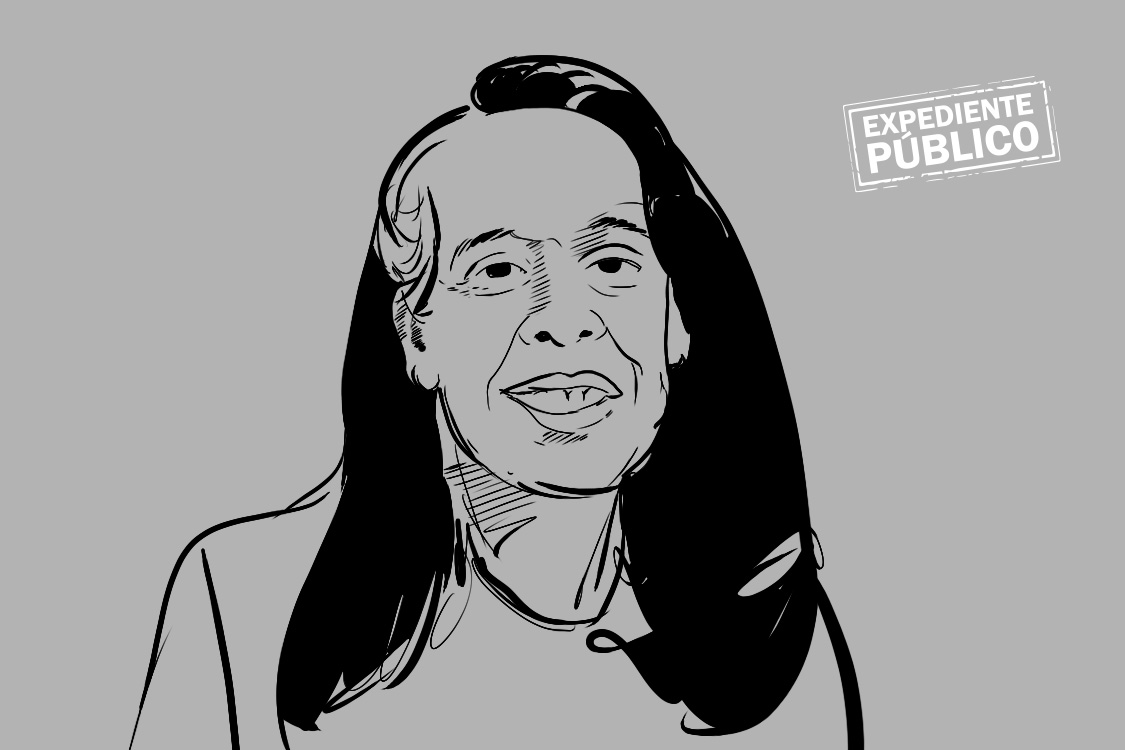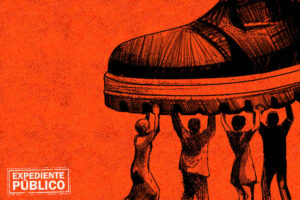*The former political prisoner spent her days in a “very dark” cell at El Chipote prison. Her deteriorated physical appearance confirms a pattern in the torture that Daniel Ortega’s regime implements on its prisoners.
**As punishment, the former guerrilla fighter Dora María Téllez was placed in a hall of male prisoners and left alone in a small cell.
Expediente Público
Political opponent, Suyén Barahona affirmed that she felt a wave of emotions during her first day of freedom. On February 9, 2023, she could “finally” hug and spend the night with her son of six years, after spending 606 days separated from him due to her being illegally detained at El Chipote prison in Managua, the capital of Nicaragua. Today, she is free but lives in exile, stripped of her nationality.
“He will comprehend the incredible excitement and happiness that was being able to hug him the same day that I was released. It was the happiest moment for both of us, being able to hear that he loved me. He told me, when we were snuggling that first night together, ‘Mom, I love you.’” That was the happiest moment, after having being deprived of seeing him, which was the cruelest punishment that I have experienced,” Barahona told Expediente Público in an interview.
Barahona was kidnapped by officials of the Daniel Ortega regime on June 13, 2021, in her home in Managua. Her son, who at time was four and half years old, witnessed the police arrive at the time of her arrest.
On December 25, 2022, the regime permitted her to facetime with her son for the first time. Her little son had spent her entire time of absence outside of the country in the company of his father, César Dubois.
Subscribe to Expediente Público’s newsletter and receive more information
“It was hard for him to recognize me during our first facetime call. He is a little boy, and we have tried not to afflict him with the pain of my absence. Even so, he asked for his mom and did not understand why we were separated or why his mom could not talk to him on the phone,” recounted Barahona.
The regime’s cruelty against women
Although the regime went to extremes with all the political prisoners, Barahona affirmed that there was a particular and huge issue of mistreatment toward women at El Chipote.

“There was something particular about the isolation that we received as women. The fact that they kept us alone in a cell almost all of the time and the case of Dora María (Téllez), with her cell located in the male prison hall, speak to this particular treatment. There is a certain hatred toward women, exemplified through the viciousness of the regime toward mothers with small children, as they were not allowed to see them,” said the exiled opponent.
At El Chipote, the regime maintained opposition leaders like Tamara Dávila, Violeta Granera, Dora María Téllez, and Ana Margarita Vijil imprisoned. The human rights defender María Ovieda also remained imprisoned.
“Several of those of us who were at El Chipote saw each other on occasion. I was kept in a cell where I could see one of them,” she remembered.
On February 9, 2023, a total of 222 political prisoners were exiled from Nicaragua and stripped of their nationality by the regime.
Read: Los cinco fieles a Daniel Ortega y ahora desterrados que nadie quería albergar en EE.UU.
“We were no table to hug or say hello to one another, so we experienced a lot of euphoria but also hurting and sadness in seeing the plane take off.”
Barahona affirmed that she maintained intact the commitment to fight to see a free and democratic Nicaragua.
“I very, very committed to end the cycle of dictatorships in which our country has experienced dictatorships, violence, and impunity, so that no mother has to experience what I have: being separated from her family and children,” she expressed.
A victim of torture in “El Chipote”
The opposition leader and president of the Unión Democrática Renovadora (UNAMOS) spent months isolated in El Chipote prison. She was a victim of torture, and her physical state is what most evidences what she suffered in prison.
“I lost a lot of weight, but what sustained me was the love and prayers from outside of prison. We all suffer from different conditions inside El Chipote. For example, it was very hard for me personally to sleep, and there were deliberate things that the officials did to interrupt our ability to sleep in prison. I was held in a very dark cell, but the light stayed on; they never turned off the light,” she told Expediente Público.
At the beginning of her captivity, just like all of the prisoners, she suffered from stomach issues. There was a period of time in which, as punishment, they reduced the amount of food for us, particularly the food entering from our family members used to complement what we received in prison,” she remembered.
Read: Expresos políticos desterrados de Nicaragua celebran la libertad en Estados Unidos
Barahona assured Expediente Público that she is still “strong” and that despite all the abuse that she suffered, her heart has not hardened.
“I am still intact in terms of my heart. I believe that an act of resistance for me is leaving without hatred, without hatred in my heart, and without spite. It is in resisting in this way that I continue on and that gives me a lot of strength,” added Barahona.
The opposition leader explained that the next step would be continue to nurture unity within the networks of Nicaraguans to achieve the “most important goal, which is definitive change” and democracy in Nicaragua.





